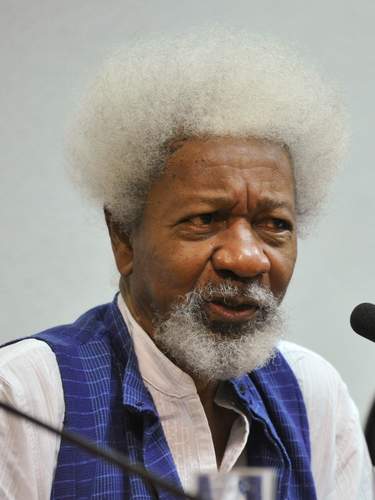Soyinka, Wole
Scrittore e drammaturgo nigeriano di lingua inglese (n. Abeokuta 1934). Completati gli studî in Inghilterra, dalla fine degli anni Cinquanta portò in scena una lunga serie di opere teatrali (The swamp dwellers, 1958; The lion and the jewel, 1959; The dance of the forest, 1960; The trial of brother Jero, 1960), attuando, con la fusione di parola, gesto e musica, un recupero della tradizione rituale yoruba che raggiunge l'esito più felice in The road (1965). Dopo l'esperienza della guerra civile, in cui subì il carcere (1967-69), tornò al teatro con il dramma Madmen and specialist (1970) e una riscrittura delle Baccanti (The Bacchae of Euripides, 1973), perseguendo, con pari ricchezza immaginativa e potenza espressiva nel tragico come nel farsesco, un teatro sacrale, testimonianza del dramma dell'uomo (Death and the king's horseman, 1975; Opera wonyosi, 1980, adattamento dell'Opera da tre soldi di Brecht; A play of giants, 1984; Requiem for a futurologist, 1985). Un forte valore simbolico permea anche le raccolte di poesie (A shuttle in the crypt, 1971; Mandelas earth and other poems, 1989), i romanzi (The interpreters, 1965, trad. it. 1979; Season of anomy, 1973, trad. it. 1981), i libri autobiografici (The man died: prison notes, 1972, trad. it. 1986; Aké: the years of childhood, 1982, trad. it. 1984). Di grande acume critico i saggi di Myth. Literature and the African world (1975; trad. it. 1995) e Art, dialogue and outrage (1988). Tra i lavori più recenti: From Zia with love (1992); The beatification of Area boy (1995); King Baabu (2002); Samarkand and other markets I have known (2002); You must set forth at dawn: a memoir (2006, trad. it. 2007); New imperialisms (2010); Of Africa (2012; trad. it. 2015); Migrazioni - Migrations. La notte dei poeti afro-italiana (2016); Beyond aesthetics. Use, abuse, and dissonance in African art traditions (2020; trad. it. 2020); Chronicles from the land of the happiest people on Earth (2021; trad. it. 2023). Premio Nobel per la letteratura nel 1986.

